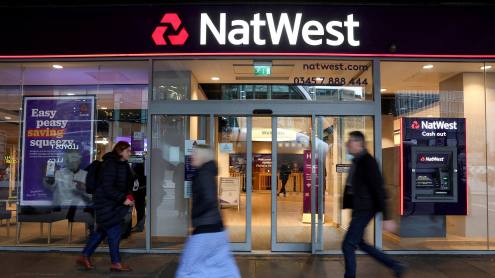Jump to
The Bank of England is examining the potential repercussions of a prolonged private equity boom’s reversal on UK businesses, amid mounting concerns over leverage, transparency and valuations.
In a statement on Wednesday, the BoE’s Financial Policy Committee warned that “finance for riskier corporates could be particularly vulnerable to a significant deterioration in investor risk sentiment”.
The FPC highlighted a heightened likelihood of a market correction, pointing to rising prices despite an uncertain economic outlook.
Officials also announced plans to scrutinise the relationships between private equity firms, grappling with increased borrowing costs, and the UK companies under their ownership.
Despite rising concern over private markets, the BoE acknowledged its comparatively limited understanding of the financial stability implications of a slowdown in private equity activity, particularly when compared to risks associated with traditional banking.
“The extent of transparency around asset valuations, overall levels of leverage, and the complexity and interconnectedness of the sector make assessing financial stability risks difficult,” the committee said.
The committee also noted that overall profitability of the UK’s major banks is expected to remain robust but indicators of market value of their future profitability, “such as average tangible price to book ratios, remain subdued”. According to press reports, these concerns resonate with broader anxieties regarding the valuation gap between UK banks and their US counterparts.
The FPC plans to delve deeper into private equity risks, with a further assessment of UK banks’ price-to-book ratios, in its Financial Stability Report slated for publication in June.
—
Merger and acquisition mega-deals have surged in the first quarter of 2024, suggesting a potential revival of the M&A market after a prolonged lull. Data released today from the London Stock Exchange Group revealed that the number of deals exceeding $10bn more than doubled compared to the same period last year.
Eleven mega-deals, totalling $215bn, were announced during the quarter, up from the five transactions worth a combined $100bn in the first quarter of 2023. The surge was predominantly driven by major US deals in the energy, technology and financial sectors.
Despite a 31 per cent decline in the total number of announced deals, the overall value of global M&A transactions was up by 30 per cent, reaching $690bn.
The rebound follows a dismal year for M&A activity in 2023, characterised by a sharp decline in dealmaking following a market uptick fuelled by record-low interest rates during the Covid-19 pandemic.
While the US dominated the M&A landscape in the first quarter, Europe witnessed a robust recovery in dealmaking, with the value of European transactions soaring by 60 per cent year-on-year to $127bn. However, Asia-Pacific deals experienced a 28 per cent decline, amounting to $90bn.
Transactions in the quarter included Capital One’s $35bn acquisition of Discover Financial and chip design toolmaker Synopsys’s $35bn takeover of engineering software maker Ansys.
However, a delay between deal announcements and closures means that bankers are still awaiting a rebound in fees. Investment banking fees have dipped slightly compared to last year, with M&A fees seeing the most significant decline, dropping by 14 per cent to $6.4bn, the lowest level since 2016, according to LSEG estimates.
—
UBS CEO Sergio Ermotti has become Europe’s highest-paid bank boss, less than a year since his return to the institution after it acquired Credit Suisse in an emergency takeover.
The bank’s annual report, released today, revealed that Ermotti received a total compensation of SFr14.4mn ($15.9mn) in 2023, exceeding his predecessor Ralph Hamers’ earnings of SFr12.6mn in 2022. Although Ermotti’s pay only covered nine months, his package would reach SFr19.2mn if calculated for a full year.
Ermotti’s pay surpassed that of HSBC CEO Noel Quinn at $10.6mn and Santander’s executive chair Ana Botin at €12.24mn. However, it falls short of counterparts on Wall Street, such as JPMorgan’s Jamie Dimon, who received $36mn.
In a statement, the UBS board attributed Ermotti’s compensation to his outstanding performance during a pivotal year for the bank. Unlike European Central Bank-regulated banks, UBS faces no cap on bonuses, allowing for such substantial awards.
In a letter accompanying UBS’s annual report, Ermotti and UBS chair Colm Kelleher responded to criticism of the bank’s size and capital requirements.
UBS is under heightened scrutiny from Swiss regulators in light of its increased systemic importance following its takeover of Credit Suisse.
They wrote that Credit Suisse’s failure stemmed from a “broken business model” rather than insufficient capital.
“The fact that we were in a position to rescue Credit Suisse, despite both firms operating under the same regulatory regime, shows the framework and capital requirements were not the problem,” they added.
—
China’s major banks are feeling the strain of a prolonged property downturn, with rising bad loans impacting their financial health. Bank of Communications disclosed on Wednesday a significant increase in its property bad loan ratio, jumping from 2.8 per cent to 4.99 per cent at the end of 2023. Similarly, its larger rival, Industrial and Commercial Bank of China reported a 9.6 per cent rise in bad loans from residential mortgages, reaching Rmb27.8bn ($3.8bn)
As reported by Bloomberg, the downturn within China’s property market is persistent as housing prices continue to decline, posing challenges for authorities striving to revive the pressured market.
Looking ahead, both banks expect continued pressure on asset quality, particularly as the recovery of housing sales and the liquidity of property developers remains uncertain.
Investors are closely monitoring the profitability and asset quality of China’s major lenders amid an economy heavily reliant on bank lending for momentum. According to official data, combined profits at China’s commercial banks rose by 3.2 per cent to Rmb2.38tn last year, marking the slowest pace of growth since 2020. Meanwhile, outstanding bad loans surged to a record high of Rmb3.23tn.
Read more: Can Evergrande’s demise salvage the Chinese property sector?







